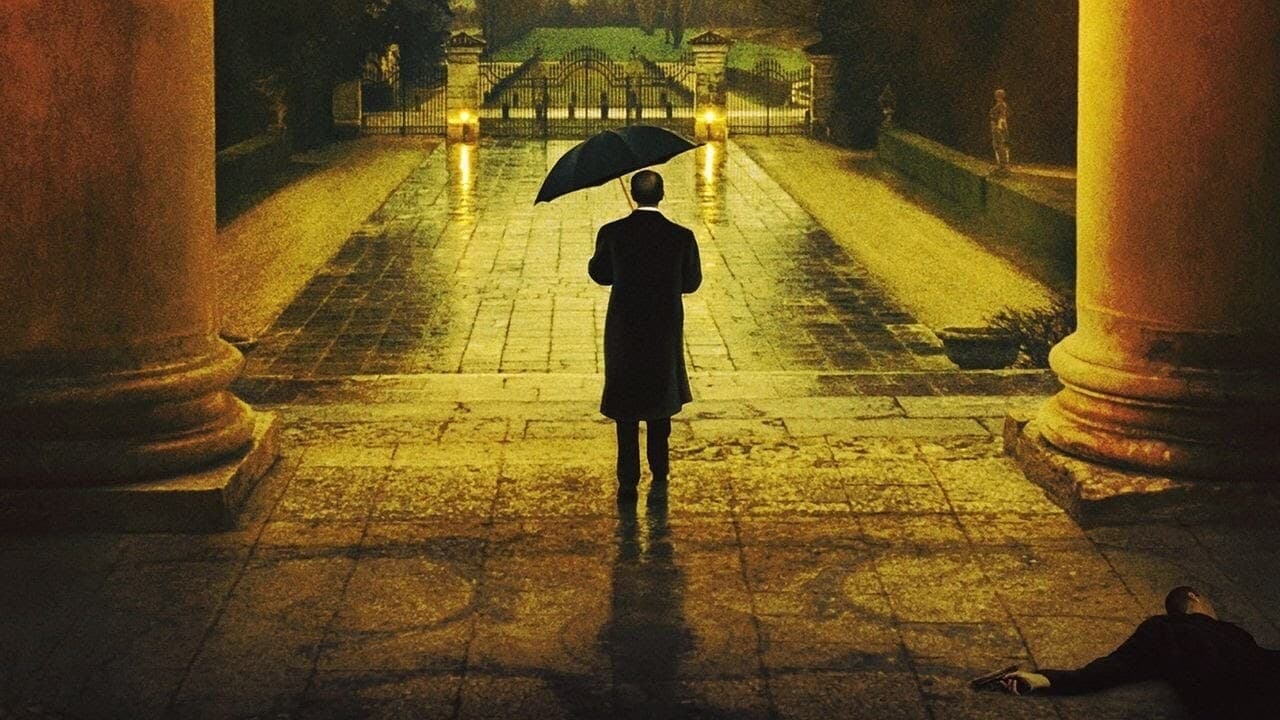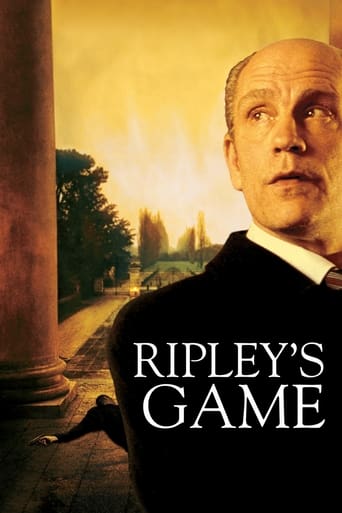Mike Roman
Any profound film, book, poem, reveals its essence in its paradox. Ripley's Game is no different. It is a paradox that plays out under the guise of an ordinary film. To this end, it is a film that is enveloped by its own protagonist-antagonist, the paradox of Tom Ripley, a Veneto-dwelling American, seemingly devoid of morals and feeling, yet with all the sensualism and erudition of an epicurean sybarite.Morricone's music, as impeccable as ever, opens the film in Berlin with a slow subtle score before embarking on the clavicembalo (harpsichord) and a beautiful aerial shot of Malkovich's little red fiat coursing through the hills of Treviso.Ripley's Game, based on Patricia Highsmith's novel about the amoral Tom Ripley and his exploits, is a fantastically underrated film which, due to its high-art European status (it was shot on location in Germany and Italy and concerns itself with art first and foremost), was largely passed over in favour of more exciting, and faster moving films. It was a huge financial flop (costing over $30m and recouping barely a tenth of that), and in spite of opening on the big screen in Europe, went straight to DVD in the states.The locations, notably Berlin and the Veneto, are part of the film's charms (dare I say characters in themselves) along with those of the triumvirate of Ripley (Malkovich), Reeves (Winstone), and Trevanny (Scott). The casting is marvellous here, and the three protagonists play off each other's strengths and weakness beautifully. From the very off, the uncouth philistine, Reeves (stoned and waxing as lyrically as he can of Berlin's architecture) aside the Renaissance man Ripley (calm and collected and slightly disgusted at Reeves' crassness), is an absolute joy to watch in its theatricality and Cavani's direction as they walk across the Gendarmenmarkt in Berlin's Mitte district with a view to pulling off a not-so-ambitious art heist.It's almost as fine a scene as one a little later where Winstone's character presents Ripley with a garrotte as they walk across another of Berlin's platz's. Here, we see Malkovich living up to his philosophy as he toys with the garrotte in plain sight as if it were a scarf. 'I don't worry about being caught' he says later on in a remarkable scene in a train station bathroom, 'because I don't believe anyone is watching.' It is this total lack of paranoia which manifests itself as a detached coolness, almost palpably terrible in its calmness, that Malkovich (avowedly a man that has never felt embarrassed) carries off so well in his quiet unruffled countenance. Of all the actors who have played Ripley in their various incarnations - Delon, Damon, Hopper, Pepper - Malkovich is by far the one whom Highsmith herself would have recommended for the role. Indeed, one wonders if it is Malkovich playing Ripley or Ripley playing Malkovich such is the quiet strength of his performance.The plot, though itself flawed, struggles a little here and there to tie (garrotte) things up, and leaves a couple of holes (emphatically, not made by bullets) here and there. But it is the plot's unconventionality, garrottes and pokers instead of guns, philosophy instead of mathematics, art instead of science, that makes the film so wonderfully watchable. It is certainly a film that, perhaps like Ripley should he ever get collared, deserves a fair trial.Ripley at one point calls himself a 'creation' and 'a gifted improviser' when Trevanny asks him who he is. Trevanny doesn't seem to understand. He has never dreamed, never improvised, he seems completely lacking in any spontaneity to the point of pathology. Perhaps this is what leukemia does to you (Trevanny we quickly learn is dying, which explains his succumbing to Ripley's outlandish deal), but perhaps not. The final scene has Trevanny in a moment of what can only be called total spontaneity, doing (or more significantly being) something that Ripley cannot himself understand. For a brief moment, and it shows on the lips of Trevanny, the roles have been switched. The master has become the protégé, the protégé become the master. It is a turnaround of some aplomb, as the circle closes and completes itself.Trevanny's name itself seems to have inspired (or have been inspired by - the timeline is a little muddy here) the airport paperback writer and American film scholar Rodney William Whitaker whose later book and bestseller Shibumi (1979) appears under the pseudonym Trevanian and has all the hallmarks of Ripley's presence, as the following quote illustrates: "Shibumi is understanding, rather than knowledge. Eloquent silence. In demeanour, it is modesty without pudency. In art, where the spirit of shibumi takes the form of sabi, it is elegant simplicity, articulate brevity. In philosophy, where shibumi emerges as wabi, it is spiritual tranquility that is not passive; it is being without the angst of becoming. And in the personality of a man, it is…. How does one say it? Authority without domination? Something like that…" It appears that Highsmith's Ripley had cause to inspire. 'All I know is that we're in a constant state of being born.' In this disclosure of Ripley's, again in the bathroom (is not the bathroom the place of revelations?), he perhaps divulges his own bodhisattva nature, not quite Buddha yet (whose birth has by his very (un)nature finished), but on the path. He doesn't quite know why he is helping Trevanny in the farcical train scene, but perhaps this is why: to lead Trevanny to his own awakening. This eventually accomplished, (nirvana comes to most at the point of death), Ripley can return to the music, to the clavicembalo which his mistress caresses so gently, and to the art of living which characterizes the one who has achieved what Whitaker later calls Shibumi. Yet, the question remains, and here is the paradox - that within Ripley's understanding and supposed enlightenment there is an obscurity. There is a darkness, and the angst of still being constantly born.
Roger Pettit
Patricia Highsmith is one of the very best crime writers of the 20th century. Her psychological thrillers are gripping and readable, none more so than the five novels featuring amoral, unemotional, conscience-free American Tom Ripley, who comes from humble beginnings and who amasses wealth by committing crimes such as theft, embezzlement and forgery. The first book in the series - The Talented Mr Ripley - was successfully adapted for the cinema. This later film, which is based on the third book in the Ripley series, is nowhere near as good as that earlier one. It fails to live up to the novel and is disappointingly dull fare. Set in Italy (with a few scenes in Berlin), the story concerns the attempt by Ripley (John Malkovich) to kill two gangsters who are a threat to him and to his British partner in crime, Reeves (Ray Winstone). The gangsters are interfering in Reeves's shady and lucrative business interests and may be able to reveal information about Ripley's criminal past. Both men therefore persuade a young British aristocrat (played by Dougray Scott), who is working as a picture framer, who is dying of acute leukaemia and who desperately needs money to support his family, to assassinate the two gangsters. But matters spiral out of control."Ripley's Game" is most noteworthy for the excellent performance given by John Malkovich. He dominates the film totally and portrays Ripley's sinister, manipulative and slightly psychopathic tendencies to perfection. However, as good as Malkovich's performance is, it cannot rescue a film whose plot and direction are frequently pedestrian, bland and boring. This is a film that is - amazingly, given the subject matter - almost wholly lacking in suspense or tension and in coherent character description and development. It is mind-numbingly dull, so much so that I almost gave up on it on a number of occasions. I decided to stick with it in the hope that it might improve. It didn't. The final scenes are unconvincing and poorly directed (as is most of the rest of the film). The score, by Ennio Morricone, is excellent. But that and Malkovich's performance apart, there is little to write home about. If you haven't read the book on which this film is based, or any of the other books featuring Tom Ripley, I urge you to do so. They are excellent thrillers. But give this very disappointing film a miss. 4/10.
pontifikator
An excellent movie showing the talented Mr. Ripley late in the game. John Malkovich and Ray Winstone are excellent. Ripley is a narcissistic sociopath who has become well-to-do, maybe even wealthy, and he uses money to manipulate a dying man into committing a murder. It's an excellent script with excellent actors. Director Liliani Cavani weaves disparate scenes together, illuminating Ripley's dead, dark heart.I can't get over how good Malkovich is at showing affectless sociopaths. I recently watched the 1945 version of "The Picture of Dorian Gray" with Hurd Hatfield as the titular villain. Hatfield's characterization was affectless also, but his face was just blank. Malkovich manages to project the soulless debauchery "Dorian Gray" was aiming for and failed to show. In one scene, Ripley watches the tormented Jonathon Trevanny (Dougray Scott) come to grips with what he has become; Ripley's issue is whether they'll make their plane. Malkovich manages to be considerate and totally heartless at the same time. It's a very impressive performance with powerful subtlety that few actors can bring off. And Malkovich does it through the whole movie."Ripley's Game" is not for everyone because the main character is not likable and has no "character development." He's almost the same when we leave him as when we first see him. At the end Ripley does seem to have some appreciation for Trevanny's moral character while having no appreciation at all for Trevanny's action. If you need to have a hero you can like, "Ripley's Game" is not for you. If you want to see a character study with a superb actor and excellent costars, you may find the movie rewarding.

